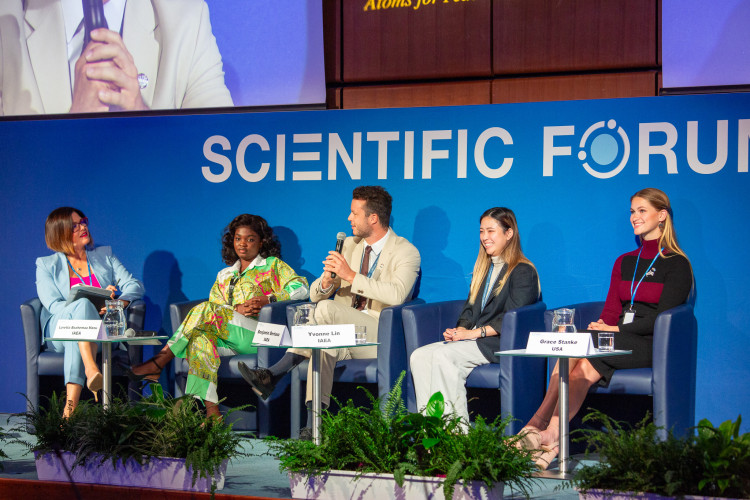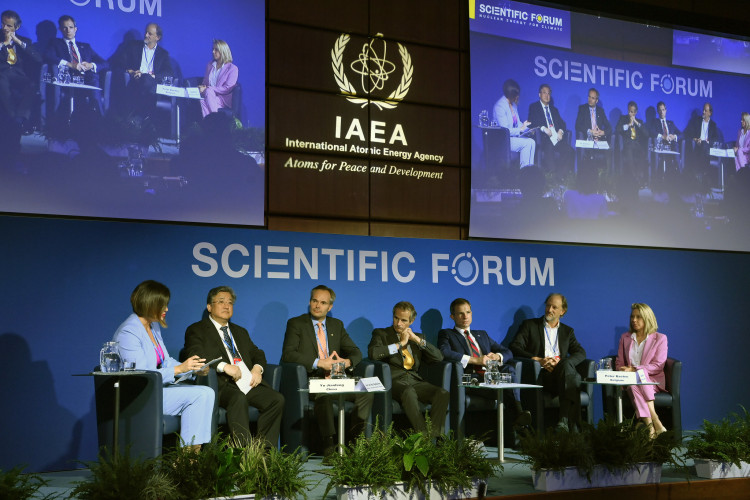Leaders from around the world meeting at the IAEA Scientific Forum: Nuclear Innovations for Net Zero agreed: the effects of climate change are undeniable, and nuclear energy is part of the solution to mitigate the climate crisis and reducing carbon emissions.
Innovations will support the integration of nuclear energy into the solutions needed to meet net zero goals and is already playing an essential role in further enhancing the performance, safety and life of existing reactor fleets, IAEA Director General Rafael Mariano Grossi said at the opening of the Forum on Tuesday on the margins of the IAEA's 67th General Conference.
However, Mr Grossi noted that achieving a fair and enabling investment environment for new nuclear projects remains an uphill battle. "We are not at a level playing field, yet, when it comes to financing nuclear projects," he said.
Over two days, experts discussed new nuclear power technologies and how innovations such as artificial intelligence, robotics and 3D printing can advance nuclear power, and how reactors can be used for applications beyond electricity by providing heat for industrial processes or freshwater through nuclear desalination (see the overview of sessions).
Watch the recording of the Scientific Forum, and read the latest IAEA Bulletin on Nuclear Innovations for Net Zero.
The role of nuclear power and innovations for a net zero world

The President of Ghana, Nana Akufo-Addo, shared Ghana's plans to include nuclear energy in the country's electricity generation mix. (Photo: D. Calma/IAEA)
There is growing global interest in nuclear energy, and countries are acting on this interest. In the opening session of the Scientific Forum, the President of Ghana, Nana Akufo-Addo, shared his plans for the inclusion of nuclear energy in the country's electricity generation mix. "We're committed to a clean, equitable energy transition that harnesses the full potential of all low carbon sources, including nuclear power," President Akufo-Addo said. "Nuclear power will play a significant part in this transformation."
Ghana is analysing small modular reactors (SMRs) and their potential for rapid deployment for clean and affordable energy. "We are working with industry experts to study the feasibility of deploying this new technology in Ghana," President Akufo-Addo said.
In the United States of America, where nuclear power provides the single largest source of clean energy, "reaching our 2050 net zero goals depends on at least tripling our nuclear energy capacity to 300 gigawatts or more," said US Secretary of Energy Jennifer Granholm. The US Government has invested "billions of dollars in the future of nuclear energy, creating historic tax incentives for investments in new facilities and production of nuclear energy," and the development of a domestic fuel supply chain is underway, she added
The US Department of Energy recently released Pathways to Commercial Liftoff, a set of reports to accelerate the deployment of clean energy technologies, including advanced nuclear reactors. Advanced reactors are key to reaching net zero goals because they can help to decarbonize energy intensive industries, such as hydrogen production, desalination, district heating, petroleum refining and fertilizer production, Secretary Granholm said. She encouraged more countries to look at nuclear energy as a sustainable, long term investment and to harness "the power of the atom for a new era of peace and prosperity in what is potentially the greatest peace project of our time - a net zero world."
The Republic of Korea is also investing in growing its nuclear sector. Since 2000, Korea has been implementing its Nuclear Power System Development Plan, with a specific focus on developing advanced reactors, and as a result, in 2012, Korea's first SMR - SMART - received the standard design approval from the Korean regulator, said Lee Jong-Ho, Minister of Science and ICT in the Republic of Korea. "Now we are developing an even more advanced and innovative SMR based on SMART technology," he added.
The Korean Government believes that the private sector should take the lead in technological innovations. "This is especially true for the SMR sector, which aims to replace fossil fuels in industries such as seawater desalination and space exploration," Minister Jong-Ho said. The Korean Government is launching the Korea SMR Initiative to transfer SMART and other advanced nuclear technologies to the private sector in order to help demonstrate and commercialize new reactors. "To kick start these efforts, starting next year, the Government will collaborate with the relevant companies to invest in developing high temperature gas reactors designed for industrial process heat with applications such as hydrogen production and other uses," he said.
In Morocco, the Government is considering adding nuclear power to its energy mix to ensure a reliable energy supply. "Morocco places a distinct focus on small modular reactors due to their numerous advantages, including the flexibility for integration," said Leila Benali, Morocco's Minister of Energy Transition and Sustainable Development, in a video statement to the Forum. "They hold significant promise for diverse applications, such as combined heat and power generation and seawater desalination."
Minister Benali also announced that Morocco's National Centre for Nuclear Energy, Sciences and Technology has been designated as an IAEA International Centre Based on Research Reactors (ICERR), enabling it to function as a global learning platform. "Morocco's national infrastructure that is now reinforced by this recognition is open for the benefit of the African continent with a focus on capacity building," she said.
For the past 40 years, Sweden has expanded different forms of renewable energy, with wind power providing a significant share of electricity, and biomass replacing oil and coal for district heating and industrial processes. "What was forgotten, though, was that the power system is very sensitive and that it has to work technically. It's not just about adding terawatt hours," said Sweden's Vice Minister for Climate and the Environment, Daniel Westlén. Considering the requirement for dispatchable energy to meet demand, when and where needed, as well as for demand to be met without carbon emissions, the options are limited. "Nuclear energy is the only option available," he added.
To reach climate and net zero goals, studies have estimated a doubling or tripling of nuclear energy capacity by 2050. "Can the world build 20 or even 40 gigawatts of nuclear energy per year? I would claim it is possible. We've done it before," Vice Minister Westlén said. In the 1980s, more than 180 reactors were under construction globally, and more than 30 gigawatts were added in one single year, he explained. Sweden deployed 12 large reactors between 1972 and 1985. While "climate change is the greatest challenge humanity has ever faced… we are in possession of the tools that we will need to solve this," he concluded.
Last year, French President Emmanuel Macron announced a programme to build six nuclear reactors, as well as a programme dedicated to nuclear and innovation with small and advanced modular reactors. "We need energy, which is at the same time cheap, affordable and sustainable. And that's not so easy to solve," said François Jacq, General Administrator of the French Atomic Energy Commission. "That's why we need innovation." Innovation will come in many forms - in applications, approaches and technologies - and will also attract the future generation to the nuclear field.
"We will also have to innovate in the field of cooperation, in partnership. We have to invent new forms of cooperation. We have to invent new forms of research and technology organization," General Administrator Jacq said.

Nuclear energy influencer, Isabelle Boemeke, provided the keynote address at the opening session of the Scientific Forum, Nuclear Innovations for Net Zero, at the IAEA 67th General Conference in Vienna, Austria, 26 September 2023. (Photo: D. Calma/IAEA)
Wrapping up the opening session, Brazilian-born nuclear energy influencer Isabelle Boemeke, reflected on the power of social media to inform young audiences. "Social media can sound superficial, but the reality is that's how young people learn about the world," said Boemeke, also known as Isodope. "They trust influencers' opinions on products, health tips and ideas. And while we've seen social media being used for bad, I believe we can leverage these tools and actually use it for good."
She brought attention to the value of leaders in listening and engaging with young generations. "Young people are very much open to it, and they're waiting to hear from people, like yourselves, that it's OK to support this technology. Getting the population informed on all the benefits grants license to our leaders to pursue realistic decarbonization paths - paths that very boldly include nuclear power at the heart," Boemke said. Encouraging the audience of decision makers to be courageous, she concluded by asking, "Are you leaders or followers?"
Read Boemeke's interview with the IAEA in the latest IAEA Bulletin on Nuclear Innovations for Net Zero.

The Scientific Forum featured a panel of young professionals in the nuclear field. They discussed their motivation to pursue a career in nuclear and the importance of diversity and inclusion. (Photo: H. Shaffer/IAEA)
The Forum included a segment on youth, featuring a panel of young professionals in the nuclear field: Benjamin Bertaux, Junior Decommissioning Expert at the IAEA; Loretta Boahemaa Manu, Associate Transport Safety Officer at the IAEA; Yvonne Lin, Nuclear Engineering Intern at the IAEA; and Grace Stanke, nuclear energy advocate and current-Miss America. They expressed how "cool" and attractive the nuclear field is for new generations and the importance of creating collaborative research projects with universities to expose students to various career paths. Insisting on the importance of promoting diversity and inclusion in the nuclear industry, the panel shared that to attract new talent, it is as much about the science as it is about storytelling and innovative ways to communicate about nuclear.
Boahemaa Manu and Lin are both fellows of the IAEA Marie Skłodowska-Curie Fellowship Programme, which is open for applicants until 30 September.
The way forward
From China to the United Kingdom and beyond, countries around the world have ambitious plans to expand their nuclear fleets. By 2035, China expects to build 150 new nuclear reactors. "We have so many coal-fired power stations that must be replaced by nuclear power," said Yu Jianfeng, Chairman of China National Nuclear Corporation, during the closing session of the Forum on Wednesday.
In the United Kingdom, "we have an ambitious target of 24 gigawatts of nuclear power to be on the UK grid by 2050," said Andrew Bowie, Parliamentary Under Secretary of State and Minister for Nuclear and Networks. "As vital as it is to decarbonize our energy baseload, it is also about prices - the cost of living, affordable energy, and being energy secure and independent."
When it comes to prices, Finland's Minister of Climate and Environment, Kai Mykkänen, told the Forum that Finland's Olkiluoto 3, Europe's largest nuclear reactor at 1.6 gigawatts, has led to the lowest electricity prices in Finland in years. Olkiluoto 3, which began regular output in April, is the key reason Finland has ceased direct electricity and natural gas imports, while simultaneously lowering electricity prices, he said.
Public acceptance, as well as financing, surrounding nuclear power must also be considered in the path forward. "We have to interact with society to ensure the technical solutions we propose will be, in the end, accepted," said Peter Baeten, Director General of the Belgian Nuclear Research Center SCK CEN. Furthermore, while technical innovation is essential, there are other aspects of innovation, said Sama Bilbao, Director General of World Nuclear Association. "We need innovation in the way we finance new nuclear. We need to think outside the box to attract investment into these nuclear projects," she added.
Given the speed and scale of innovation within the nuclear field, Director General Grossi is optimistic. "There are challenges, but it is clear - we are moving decisively. We are moving, perhaps, at different paces and in different ways," he said. "The end result will not be uniform because there is not a one-size-fits-all solution. But we can see how nuclear is very firmly positioned in this global effort that is taking place now."

The closing session of the Scientific Forum at the IAEA 67th General Conference held at the IAEA headquarters in Vienna, Austria, 27 September 2023. (Photo: D. Calma/IAEA)






